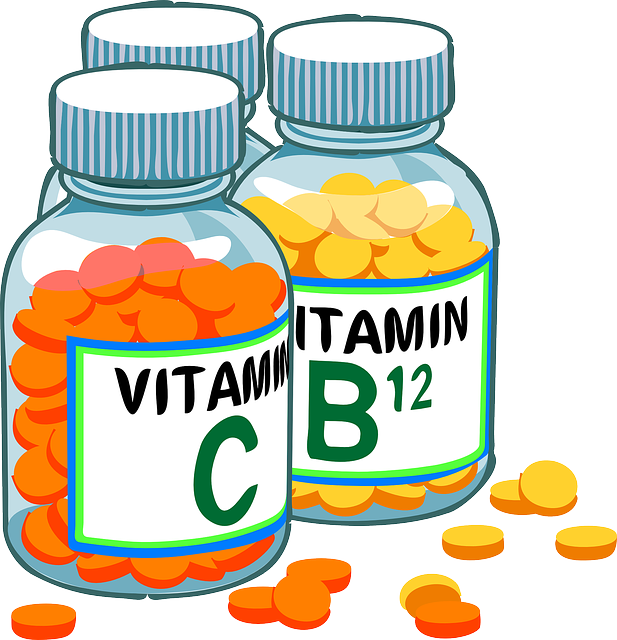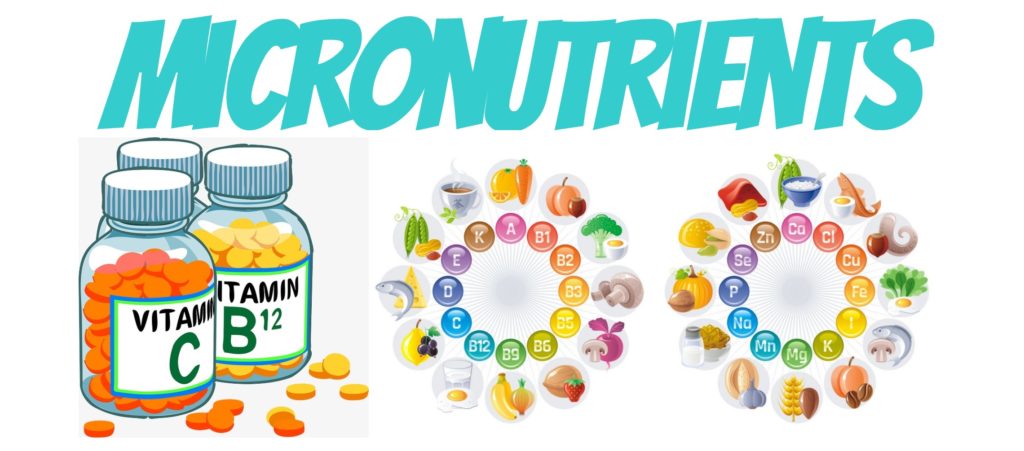Micronutrients: Types, Functions, Benefits and More
Micronutrients are a group of nutrients that our bodies need in smaller amounts compared to macronutrients (carbohydrates, proteins, and fats) but are essential for good health. Micronutrients include vitamins and minerals, and they play crucial roles in various bodily functions such as growth, metabolism, immunity, and overall wellbeing.
There are two types of micronutrients: vitamins and minerals.
Vitamins are organic compounds that our bodies cannot produce on their own, so we must obtain them through our diet. There are 13 essential vitamins, and each plays a unique role in the body. Here are some of the most important vitamins and their functions:
Vitamin A: Essential for vision, skin health, Found in foods such as sweet potatoes, carrots, spinach, and liver.
Vitamin B complex: A group of eight vitamins that play a role in energy metabolism, brain function, and DNA synthesis. Found in foods such as meats, dairy, and leafy green vegetables.
Vitamin C: Essential for wound healing, and collagen synthesis. Found in foods such as citrus fruits, strawberries, kiwi, and bell peppers.
Vitamin D: Important for bone health, immune function, and calcium absorption. Found in few foods, including fatty fish, egg yolks, and fortified dairy products. The body can also produce vitamin D when the skin is exposed to sunlight.
Vitamin E: An antioxidant that helps protect cells from damage. Found in foods such as nuts, seeds, and vegetable oils.
Vitamin K: Essential for blood clotting Found in leafy green vegetables, such as spinach and kale, and other foods such as broccoli, liver, and egg yolks.
Minerals are inorganic compounds that are also essential for good health. Unlike most vitamins though, minerals can be obtained from both plant and animal-based foods. Here are some of the most important minerals and their functions:
Calcium: Essential for strong bones and teeth, muscle function, and nerve transmission. Found in foods such as dairy products, leafy green vegetables, and fortified foods.
Iron: Important for the formation of red blood cells and oxygen transport. Found in foods such as meat, poultry, fish, beans, and fortified grains.
Magnesium: Involved in muscle and nerve function, bone health, and energy production. Found in foods such as whole grains, leafy green vegetables, nuts, and seeds.
Potassium: Important for blood pressure regulation and heart health. Found in foods such as bananas, potatoes, tomatoes, and leafy green vegetables.
Zinc: Essential for immune function, wound healing, and DNA synthesis. Found in foods such as oysters, beef, pork, and fortified cereals.
Biochemical functions
Micronutrients have a variety of biochemical functions in the body, including:
Vitamins: Micronutrients such as vitamins act as cofactors or coenzymes, which are essential for many metabolic processes. For example, vitamin A is essential for vision, vitamin C is involved in collagen synthesis, and vitamin D is necessary for calcium absorption.
Minerals: Minerals are involved in a variety of functions, such as the formation of bones and teeth, nerve function, and energy metabolism. For example, iron is necessary for the transport of oxygen in the blood.
Antioxidants: Some micronutrients, such as vitamin C, vitamin E, and selenium, act as antioxidants, which help to protect the body from damage caused by free radicals.
Enzymes: Micronutrients such as zinc and copper are important components of enzymes, which are involved in many metabolic processes in the body.
Hormones: Micronutrients such as iodine and selenium are involved in the production of hormones, which regulate many body functions.
Micronutrients Meet the Microbiota
Micronutrients play an essential role in maintaining the proper structure of a healthy microbiota, which is the collection of microorganisms that live in and on the human body. The microbiota is essential for various physiological functions, including digestion, metabolism, and even mental health.
Micronutrients, such supplements as vitamins and minerals are essential for the growth and function of beneficial bacteria in the gut. These bacteria rely on micronutrients to produce enzymes and other molecules that aid in digestion and nutrient absorption. For example, the B vitamins are essential for the growth of certain bacteria in the gut, and vitamin C helps to protect the gut lining from damage.
On the other hand, a deficiency in micronutrients can lead to dysbiosis, an imbalance in the microbiota that can contribute to various health issues. For example, a deficiency in vitamin D has been linked to an increased risk of inflammatory bowel disease, while low levels of iron can promote the growth of harmful bacteria in the gut.
In addition to supporting the growth of beneficial bacteria, micronutrients also play a crucial role in immune function. Many vitamins and minerals, such as vitamin C, vitamin E, zinc, and selenium, have antioxidant properties that help to protect the body against harmful free radicals and other oxidative stressors. These nutrients also support the function of immune cells, such as T cells and B cells, which play a critical role in fighting infections and disease.
Overall, consuming a diet rich in a variety of micronutrients is essential for maintaining a healthy microbiota and supporting optimal health and wellness.

Water-Soluble Vitamins
Water-soluble vitamins are a group of micronutrients that dissolve in water and are not stored in the body to the same extent as fat-soluble vitamins.
This means that water-soluble vitamins need to be regularly consumed in the diet to maintain optimal health. There are nine water-soluble vitamins, which include vitamin C and the eight B vitamins: thiamine (B1), riboflavin (B2), niacin (B3), pantothenic acid (B5), pyridoxine (B6), biotin (B7), folic acid (B9), and cobalamin (B12).
Water-soluble vitamins have many important functions in the body, including acting as coenzymes that help enzymes to carry out their functions. They are also involved in the metabolism of carbohydrates, proteins, and fats, as well as in the production of energy. Additionally, water-soluble vitamins play a role in the maintenance of healthy skin, eyes, and hair, and in the formation of collagen.
One of the unique features of water-soluble vitamins is that they are easily excreted from the body in the urine. This means that excess amounts of these vitamins are unlikely to accumulate in the body, unlike fat-soluble vitamins, which can build up to toxic levels if consumed in excess.
Some common dietary sources of water-soluble vitamins include:
Vitamin C: citrus fruits, strawberries, kiwi, tomatoes, broccoli, red and green peppers
Thiamine (B1): whole grains, enriched breads and cereals, pork, legumes
Riboflavin (B2): milk, cheese, leafy greens, liver, fortified cereals
Niacin (B3): meat, fish, poultry, peanuts.
Pantothenic acid (B5): liver, sunflower seeds, mushrooms, avocados, fortified cereals
Pyridoxine (B6): poultry, fish, potatoes, chickpeas, bananas
Biotin (B7): eggs, nuts, sweet potatoes, cauliflower.
Folic acid (B9): leafy greens, asparagus, broccoli, beans, fortified cereals
Cobalamin (B12): meat, fish, poultry, dairy products, fortified cereals
Reference nutrient intakes of micronutrients
Reference Nutrient Intakes (RNIs) are the amounts of nutrients that are considered sufficient to meet the nutritional needs of most healthy people within a specific population group. RNIs are used clinical nutrition and to set dietary reference values for micronutrients, including vitamins and minerals.
The RNIs for micronutrients are determined by scientific experts based on a variety of factors, including the nutrient’s bioavailability, metabolic fate, and functional effects in the body. RNIs can also be influenced by age, gender, pregnancy status, and other individual factors that may affect nutrient requirements.
Meeting the RNI for micronutrients is important for maintaining good health and preventing nutrient deficiencies. Micronutrient deficiencies can lead to a range of health problems, including anemia, and developmental disorders.
It is important to note that RNIs are not necessarily the optimal intake levels for all individuals, as some people may require higher or lower amounts of specific micronutrients based on their individual needs and health status. Therefore, RNIs should be used as a general guideline for nutrient intake, and individuals with specific health concerns or dietary needs should consult with a healthcare provider or registered dietitian to determine the appropriate nutrient intake levels for their individual needs.
Fat-Soluble Vitamins
Fat-soluble vitamins are a group of eight essential nutrients and micronutrients that are soluble in fats and oils. These vitamins are stored in the body’s fatty tissues and liver, unlike water-soluble vitamins which are not stored in the body and must be consumed daily.
There are four types of fat-soluble vitamins: vitamin A, vitamin D, vitamin E, and vitamin K. Each of these vitamins plays a specific role in maintaining the health of the body.
Vitamin A: This vitamin is essential for maintaining healthy eyesight, skin, and mucous membranes. It also helps to strengthen the immune system and is important for bone growth. Foods that are high in vitamin A include liver, egg yolks, and orange and yellow fruits and vegetables such as carrots and sweet potatoes.
Vitamin D: This vitamin is important for maintaining healthy bones and teeth. It also plays a role in the absorption of calcium and phosphorus. And it is unique in that it can be produced by the body through exposure to sunlight. However, it can also be found in foods such as fatty fish, egg yolks, and fortified milk and cereals.
Vitamin E: This vitamin acts as an antioxidant, helping to protect the body’s cells from damage caused by free radicals. It is also important for maintaining healthy skin and eyes. Foods that are high in vitamin E include nuts, seeds, and vegetable oils.
Vitamin K: This vitamin is essential for blood clotting and bone health. It can be found in green leafy vegetables, such as spinach and kale, as well as in some oils and dairy products.
It’s important to note that fat-soluble vitamins can accumulate in the body and can be toxic in large doses. Therefore, it’s important to consume them in moderation and under the guidance of a healthcare professional.

Micronutrients (vitamins and mineral deficiencies)
Micronutrient deficiencies occur when the body does not get enough essential vitamins and minerals that are required for optimal health and functioning. These vitamin and mineral deficiencies can result from a variety of factors including poor diet, malabsorption, certain medical conditions, and lifestyle factors such as alcohol consumption and smoking.
Common micronutrient deficiencies include:
Iron deficiency: Iron is essential for the production of red blood cells, and a deficiency can lead to anemia. Good sources of iron include red meat, poultry, fish, beans, and leafy greens.
Vitamin D deficiency: It is necessary for strong bones and a healthy immune system. It is primarily obtained from sunlight, but can also be found in fatty fish, egg yolks, and fortified foods.
Vitamin B12 deficiency: Vitamin B12 is important for proper nerve function and the production of red blood. Deficiencies are more common in vegetarians and vegans as B12 is primarily found in animal-based products.
Calcium deficiency: Calcium is essential for strong bones and teeth, as well as proper muscle and nerve function. Good sources of calcium include dairy products, leafy greens, and fortified foods.
Zinc deficiency: Zinc is important for immune function and wound healing. It is found in a variety of foods, including oysters, red meat, poultry, beans, and nuts.
Magnesium deficiency: Magnesium is necessary for proper muscle and nerve function. Good sources of magnesium include whole grains, nuts, seeds, and leafy greens.
Vitamin A deficiency: Vitamin A is important for vision, immune function, and skin health. It can be found in animal-based foods such as liver, eggs, and dairy products, as well as in some fruits and vegetables.
Iodine deficiency: Iodine is essential for thyroid function and proper brain development. It is found in iodized salt, seafood, and dairy products.
If left untreated, micronutrient deficiencies can lead to serious health problems, such as anemia, weakened immune system, and stunted growth and development. It is important to maintain a balanced and varied diet to ensure adequate intake of all essential micronutrient.
Trace Minerals
Trace minerals are essential minerals that are required by the body in very small amounts. They play important roles in many physiological processes and are important for overall health and well-being. Some common trace minerals include iron, zinc, copper, manganese, selenium, chromium, and iodine.
Iron is an essential component of hemoglobin, which is the protein in red blood cells that carries oxygen throughout the body. Iron deficiency can lead to anemia, which is characterized by fatigue, weakness, and shortness of breath.
Zinc is important for immune function, wound healing, and cell division. It is also important for the senses of taste and smell. Zinc deficiency can lead to growth retardation, immune dysfunction lung cancer, and delayed sexual maturation.
Copper is essential for the the proper bone development, formation of red blood cells, connective tissue, and the functioning of the nervous system. Copper deficiency can lead to anemia, bone abnormalities, and impaired immune function.
Manganese is involved in the metabolism of carbohydrates, amino acids, and cholesterol. It is also important for bone health and wound healing. Manganese deficiency is rare but can lead to impaired growth, skeletal abnormalities, and reproductive dysfunction.
Selenium is a powerful antioxidant that helps protect cells from damage. It is also important for thyroid function and the immune system. Selenium deficiency can lead to muscle weakness, fatigue, and an increased risk of heart disease.
Chromium is important for glucose metabolism and insulin sensitivity. It is also important for protein metabolism and the synthesis of fatty acids and cholesterol. Chromium deficiency is rare but can lead to impaired glucose tolerance and insulin resistance.
Iodine is important for the production of thyroid hormones, which regulate metabolism and growth. Iodine deficiency can lead to goiter, hypothyroidism, and impaired brain development in infants and children.
Socioeconomic effects
Micronutrient deficiencies can have significant socioeconomic effects, especially in developing countries. These deficiencies are more common in populations with limited access to nutrient-dense foods, clean water, and proper sanitation.
Micronutrient deficiencies can lead to stunted growth, impaired cognitive development, weakened immune systems, and increased morbidity and mortality rates. These outcomes can have far-reaching impacts on the affected individual, as well as their families and communities.
In addition, micronutrient deficiencies can have economic consequences, including decreased productivity and increased healthcare costs. For example, iron-deficiency anemia can result in fatigue, reduced cognitive function, and decreased work capacity, leading to lost wages and lower economic output.

People at risk of an inadequate intake
Certain groups of people are at a higher risk of developing a micronutrient deficiency due to various reasons, such as inadequate dietary intake, impaired absorption or utilization, or increased nutrient needs. Some of these groups include:
Pregnant and breastfeeding women: Women who are pregnant or breastfeeding require higher amounts of certain micronutrients, such as iron, folate, and calcium, to support fetal and infant growth and development.
Infants and young children: Infants and young children have high nutrient needs for growth and development. They are particularly at risk of deficiencies in iron, zinc, vitamin A.
Older adults: Older adults may have decreased absorption of certain micronutrient, as well as decreased appetite, which can lead to inadequate intake. They are particularly at risk of deficiencies in vitamin D, vitamin B12, and calcium.
Vegetarians and vegans: Vegetarians and vegans may be at risk of deficiencies in certain micronutrients that are primarily found in animal products, such as vitamin B12, iron, and zinc.
Individuals with certain medical conditions: Individuals with certain medical conditions, such as celiac disease or Crohn’s disease, may have impaired absorption of certain micronutrient, such as iron or vitamin B12. Those with kidney disease may need to limit their intake of certain minerals, such as potassium and phosphorus.
It is important for individuals in these groups to be aware of their nutrient needs and to consume a varied and a rich diet to meet these needs. In some cases, a healthcare professional may recommend supplementation to address a deficiency or increased need for a specific nutrient.
What are the different types of micronutrients required by our body?
There are two types of micronutrients required by our body: vitamins and minerals.
Vitamins are organic compounds that are required in small quantities for various physiological functions such as growth, development, and metabolism. There are 13 vitamins in total, which are further classified into two categories: water-soluble vitamins (vitamin C and B-complex vitamins) and fat-soluble vitamins (vitamins A, D, E, and K).
Minerals are inorganic substances that are also required in small amounts for various physiological functions such as bone formation, nerve function, and muscle contraction. There are two types of minerals: microminerals (required in larger amounts) and trace minerals (required in smaller amounts). Macrominerals include calcium, phosphorus, magnesium, sodium, potassium, and chloride, while trace minerals include iron, zinc, copper, iodine, selenium, manganese, fluoride, and chromium.
Overall, both vitamins and minerals play crucial roles in maintaining our health and wellbeing.
Changes in micronutrient status as a result of disease
Diseases can have a significant impact on micronutrient status. For example, gastrointestinal diseases can interfere with nutrient absorption, while chronic illnesses can lead to increased nutrient requirements or altered nutrient metabolism. Here are a few examples of how certain diseases can affect it.
Inflammatory Bowel Disease (IBD): IBD, which includes Crohn’s disease and ulcerative colitis, can cause malabsorption of several micronutrients including iron, vitamin B12, and zinc.
Celiac Disease: People with celiac disease have an immune reaction to gluten, a protein found in wheat, barley, and rye. This reaction damages the small intestine, leading to malabsorption of several micronutrients, including iron, calcium and B vitamins.
Diabetes: Diabetes can affect it in a few ways. Poorly controlled blood sugar levels can cause excess excretion of certain micronutrient, such as magnesium, and increase the risk of deficiencies. Diabetes can also cause oxidative stress, which can increase the need for antioxidants like vitamin C and vitamin E.
Chronic Kidney Disease (CKD): People with CKD are at increased risk of several micronutrient deficiencies due to decreased kidney function. CKD can cause low levels of vitamin D, iron, zinc, and vitamin B12.
It’s important for individuals with chronic illnesses to work with their healthcare provider to monitor their micronutrient status and make adjustments to their diet and supplementation as needed.

Population groups with known poor intake or increased requirements
There are certain population groups that are known to have poor intake or increased requirements for micronutrients. These include:
Pregnant and lactating women: Pregnant and lactating women have increased nutrient needs, especially for iron, folate, and calcium. If these nutrients are not consumed in sufficient amounts, it can lead to anemia, neural tube defects in the fetus, and osteoporosis.
Infants and young children: Infants and young children have high nutrient requirements for growth and development. They are particularly at risk of iron, zinc, and vitamin A deficiencies, which can lead to impaired growth, poor immune function, and blindness.
Vegetarians and vegans: Vegetarians and vegans may be at risk of deficiencies in certain micronutrients, particularly vitamin B12, which is primarily found in animal products. They may also be at risk of iron and zinc deficiencies if their diet is not carefully planned.
Older adults: Older adults may have reduced absorption of certain micronutrients, such as vitamin B12 and vitamin D. They may also have increased requirements for calcium to maintain bone health.
Chronic disease sufferers: People with chronic diseases such as Crohn’s disease, celiac disease, and kidney disease may have reduced absorption of certain micronutrients or increased nutrient losses. This can lead to deficiencies in vitamins and minerals such as iron, calcium.
It is important for these population groups to be aware of their increased nutrient needs and to consume a well-balanced and varied diet that includes nutrient-dense foods. In some cases, supplements or fortified foods may be necessary to ensure adequate nutrient intake.
What is the difference between macronutrients and micronutrients?
Macronutrients and micronutrients are two different types of nutrients that our body needs for proper functioning, growth, and development.
Macronutrients are the nutrients required in large amounts by our body to provide energy, support growth, and repair tissues. The three macronutrients are carbohydrates, proteins, and fats. They are called macronutrients because our body requires them in large amounts, typically measured in grams, to carry out their functions.
On the other hand, micronutrients are required in smaller amounts but are still crucial for our health. Micronutrients include vitamins and minerals, and they are responsible for carrying out a variety of functions in our body, including maintaining a healthy immune and nervous system function in, promoting normal growth and development, and supporting various physiological processes. Unlike macronutrients, micronutrients are required in much smaller amounts, typically measured in milligrams or micrograms.
In summary, macronutrients provide energy and support growth, while micronutrients help our body function properly and maintain overall health.
5 Sources of further information and advice
National Institutes of Health Office of Dietary Supplements: This is a comprehensive resource for information on all vitamins and minerals, including their recommended daily intakes, functions, and potential health benefits.
World Health Organization: The WHO provides information on the importance of micronutrients in the prevention of nutrient deficiencies, and also offers guidelines for the assessment and control of micronutrient deficiencies.
Academy of Nutrition and Dietetics: This organization provides information on nutrition and dietetics, including the role of micronutrients in a healthy life.
Registered Dietitian Nutritionists: Registered dietitian nutritionists are licensed professionals who can provide individualized advice on nutrition and the role of micronutrients in a healthy diet.
Micronutrient Information Center: This resource, provided by the Linus Pauling Institute at Oregon State University, offers up-to-date information on vitamins, minerals, and other micronutrients, including their sources, recommended intakes, and potential health benefits.
Micronutrient Supplements
They are dietary supplements that provide vitamins, minerals, and other micronutrients in concentrated forms. They are designed to complement a healthy diet and ensure that the body receives adequate amounts of essential micronutrients. They come in many forms, including tablets, capsules, powders, and liquids.
While micronutrient supplements can be beneficial in certain circumstances, they should not be used as a replacement for a diet. Whole foods provide a variety of essential micronutrients in a form that is readily absorbed and utilized by the body. In addition, some micronutrients can be toxic in excessive amounts, and taking high doses of supplements can lead to adverse effects.
That being said, certain populations may benefit from micronutrient supplements, such as pregnant women who require additional iron and folic acid, vegans and vegetarians who may have a higher risk of deficiencies in vitamin B12 and zinc, and elderly individuals who may have difficulty absorbing certain nutrients. However, it is important to consult with a healthcare provider before taking any micronutrient supplements, as they may interact with medications or have other contraindications.
In conclusion, while micronutrient supplement can be a useful tool for ensuring adequate intake of essential vitamins and minerals, they should be used with caution and as part of an overall healthy lifestyle.
Zinc (Zn)
Zinc (Zn) is an essential trace mineral that plays a vital role in various physiological processes in the human body. It is required for the functioning of more than 300 enzymes involved in metabolism, DNA synthesis, immune function, and other cellular processes. Zinc is also essential for the growth and development of tissues and for wound healing.
The human body does not store zinc, so it must be obtained through the diet or supplements. Foods that are high in zinc include oysters, beef, pork, chicken, beans, nuts, and fortified cereals. The recommended daily intake of zinc for adults is 11 mg for men and 8 mg for women.
A deficiency in zinc can cause a variety of health problems, including delayed wound healing, impaired immune function, growth retardation, and skin problems. Zinc deficiency is also associated with an increased risk of infections and chronic diseases such as diabetes, cardiovascular disease, and cancer.
Zinc supplements are commonly used to treat zinc deficiencies, and they are available in various forms, including tablets, capsules, and lozenges. However, excessive zinc intake can be harmful, and it can cause symptoms such as nausea, vomiting, diarrhea, and abdominal cramps. Long-term excessive zinc intake can also lead to copper deficiency and impaired immune function.
It is important to note that while zinc supplements can be useful in treating zinc deficiencies, they are not a substitute for a healthy and rich diet. It is always recommended to obtain nutrients from whole foods whenever possible. If you are considering taking a zinc supplement, it is important to consult with a healthcare professional first to determine if it is necessary and safe for you.
What are the micronutrients required by the plants?
Micronutrients, also known as trace elements, are essential minerals that plants need in small amounts to grow and thrive. While there are many micronutrients required by plants, the most common ones include:
Iron (Fe): Iron is essential for chlorophyll synthesis, which is necessary for photosynthesis, and also plays a role in enzyme activity.
Manganese (Mn): Manganese is necessary for photosynthesis and helps with the breakdown of carbohydrates and nitrogen metabolism.
Zinc (Zn): Zinc is required for proper enzyme function and protein synthesis, and plays a role in the growth and development of plants.
Copper (Cu): Copper is important for chlorophyll synthesis, respiration, and lignin formation in cell walls.
Boron (B): Boron plays a role in cell wall structure and function, and is important for calcium uptake and proper hormone function.
Molybdenum (Mo): Molybdenum is necessary for nitrogen fixation, the process by which atmospheric nitrogen is converted to a form that can be used by plants.
Chlorine (Cl): Chlorine is important for water and nutrient uptake, and plays a role in osmotic regulation.
While plants require micronutrients in small amounts, a deficiency of any one of these nutrients can have a significant impact on plant growth and development. It is important for farmers and gardeners to monitor their soil nutrient levels and supplement with micronutrients as necessary to ensure healthy plant growth.
Are there sufficient amounts of the nutrient in the typical healthy diet?
The sufficiency of micronutrients in a typical balanced diet depends on various factors, including dietary habits, food availability, lifestyle, and genetics. While a well-balanced diet is generally sufficient to meet the recommended intake of micronutrients, certain population groups may be at risk of inadequate intake due to various reasons such as poor dietary habits, restricted food choices, health conditions, and lifestyle factors.
Micronutrient Deficiencies
Micronutrient deficiencies refer to the inadequate intake or low availability of essential vitamins and minerals required for optimal health. These deficiencies can have serious consequences for the body, ranging from mild symptoms like fatigue and weakness to severe conditions like anemia, impaired immune function, and impaired growth and development.
Micronutrient deficiencies are a significant public health concern globally, with an estimated two billion people suffering from them. The most commonly deficient micronutrients are iron, iodine, vitamin A, and zinc, which affect the most vulnerable populations, including pregnant women, young children, and the elderly.
The causes of micronutrient deficiencies are diverse and can include inadequate intake due to poverty or limited access to nutrient-rich foods, impaired absorption due to digestive disorders or certain medications, increased nutrient requirements during pregnancy or lactation, and increased losses due to chronic illness, diarrhea, or sweating.
To prevent micronutrient deficiencies, it is essential to consume a well-balanced diet that includes a variety of nutrient-dense foods, such as fruits, vegetables, lean proteins, and healthy fats. In some cases, supplementation may be necessary to meet increased nutrient requirements, especially during pregnancy or in individuals with digestive disorders or certain medical conditions.

How to optimize provision of trace elements and vitamins
Consuming a varied and balanced diet rich in nutrient-dense foods, such as fruits, vegetables, lean proteins, and low-fat dairy products.
Considering fortified foods, such as fortified breakfast cereals, milk, and juices, which can be an additional source of micronutrients.
Supplementation with multivitamins or specific micronutrient supplements may be necessary for individuals with limited access to a variety of foods or for those with specific medical conditions that affect micronutrient absorption.
Food fortification programs by governments or non-profit organizations to increase the micronutrient content of staple foods, such as iodized salt or fortified wheat flour.
Addressing factors that can reduce micronutrient absorption or utilization, such as alcohol consumption, smoking, and certain medications.
In conclusion
In conclusion, micronutrients are essential for our body to function properly and maintain good health. They are required in small amounts but have a significant impact on various bodily functions. While a balanced diet is the best way to obtain micronutrients, sometimes supplements may be necessary to address deficiencies. It is important to keep in mind that excessive intake of certain micronutrients can have adverse effects on health, so it’s crucial to consume them in moderation. By understanding the importance of micronutrients and making sure we consume them in adequate amounts, we can take steps towards a healthier lifestyle and prevent micronutrient deficiencies.

Pingback: Thriving Under Pressure: A Guide to Understanding and Managing Stress for Men – Healthy Man’s Journal
Pingback: The definition of health: The Complete Guide to Physical, Mental and Social Well-being – Healthy Man’s Journal